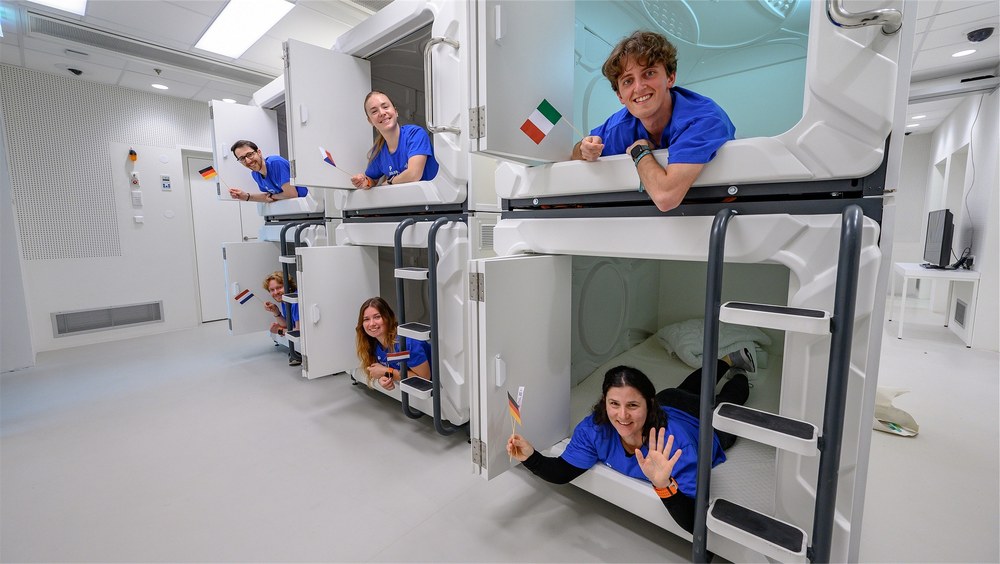Applications closed for SOLIS100 – 100-day space analog mission: Participants wanted for isolation study at DLR

+++ Update: December 12, 2025: Applications closed for SOLIS100 +++
SOLIS100: A study on the effects of 100 days of isolation and confinement on human health, behavior, performance, and well-being; initiated and funded by the European Space Agency (ESA) and organized and conducted by the German Aerospace Center (DLR) in Cologne, Germany.
Future space missions will go beyond Earth's orbit and set their sights on distant destinations such as the Moon or Mars. Since such missions will involve long travel times, it is more important than ever to prepare astronauts for the psychological and physiological challenges of long-term missions. Missions to the Moon and Mars require resilience, autonomy, and the ability to cope with isolated and confined environments. To ensure mission success, the effects of these extreme conditions on human health, behavior, and performance need to be examined.
The European Space Agency (ESA) and the German Aerospace Center (DLR) are launching SOLIS100, a pioneering isolation and confinement study designed to advance human spaceflight research. This study will take place in the first half of 2026 at the DLR aerospace medical research facility :envihab in Cologne. We are now looking for participants for our international study crew.
Isolation studies have a long tradition as a ground-based analog for long-duration spaceflight missions to investigate the effects of isolation and confinement on human health, behavior, performance, and well-being. SOLIS100 aims to assess the risks of space missions involving prolonged isolation, confined environments, and social deprivation in order to expand the scope and nature of physiological and psychological support and make it applicable to future space travel.
To simulate the conditions of a real spaceflight mission, six carefully selected participants will live in a simulated space station with limited resources for 100 days. Their daily routine will mirror that of astronauts in terms of teamwork, scientific research, and operational challenges. This study will provide important data on the physiological and psychological support required for long-duration spaceflight missions.
The study is currently scheduled to begin on April 7, 2026. The study is expected to end on August 7, 2026.
To ensure meaningful and high-quality results, we are looking for exceptional individuals who meet the following criteria:
Core requirements
- Age: 25–55 years
- Health: Physically fit individuals who pass a comprehensive medical-psychological examination
- Body mass index: 18.5 to 30 kg/m²
- Language skills: Verifiable proficient English skills for communication and research purposes at the time of application (study language: English)
Educational and professional background:
- Bachelor's degree required (master's degree or equivalent preferred, can be substituted with relevant professional experience)
- Preferred expertise: medicine, software engineering, technology, or other relevant fields
- Teaching experience is an advantage
- Citizens from the EU/EEA: no visa required, participants must register at the local registration office after arrival in Germany. Travel insurance is covered by DLR.
- Non-EU/EEA citizens: visa and residence permit for long-term stay (more than 90 days) required. Travel insurance is at your own expense.
Medical and psychological screening
- Medical health questionnaires and examination by your family doctor/a physician of your choice (medical history, analysis of laboratory values, resting ECG)
- Psychological screening: Your suitability for a mission in isolation will be determined by various questionnaires and a psychological test procedure carried out at the German Aerospace Center in Hamburg.
- Insurance and certificate of conduct: Participants must provide proof of valid health insurance and proof of cleared criminal background check (official certificate of conduct).
Physical fitness requirements
- Physical fitness: Regular physical exercise is an essential part of the study.
Time requirement and schedule
The study will last 126 days and consist of four phases:
- Team building: 2 days
- Baseline data collection phase: 14 days
- Isolation phase: 100 days
- Recovery phase: 7 days
- In addition, two follow-up examinations are planned after 30 days and after three to six months.
- The study is currently scheduled to begin on April 7, 2026. The study is expected to end on August 7, 2026.
Location
The study will be conducted at the :envihab research facility at the DLR Institute of Aerospace Medicine in Cologne, Germany.
Expense allowance
The financial compensation for full participation in the study is €23,000.
Kontakt
Study Team
